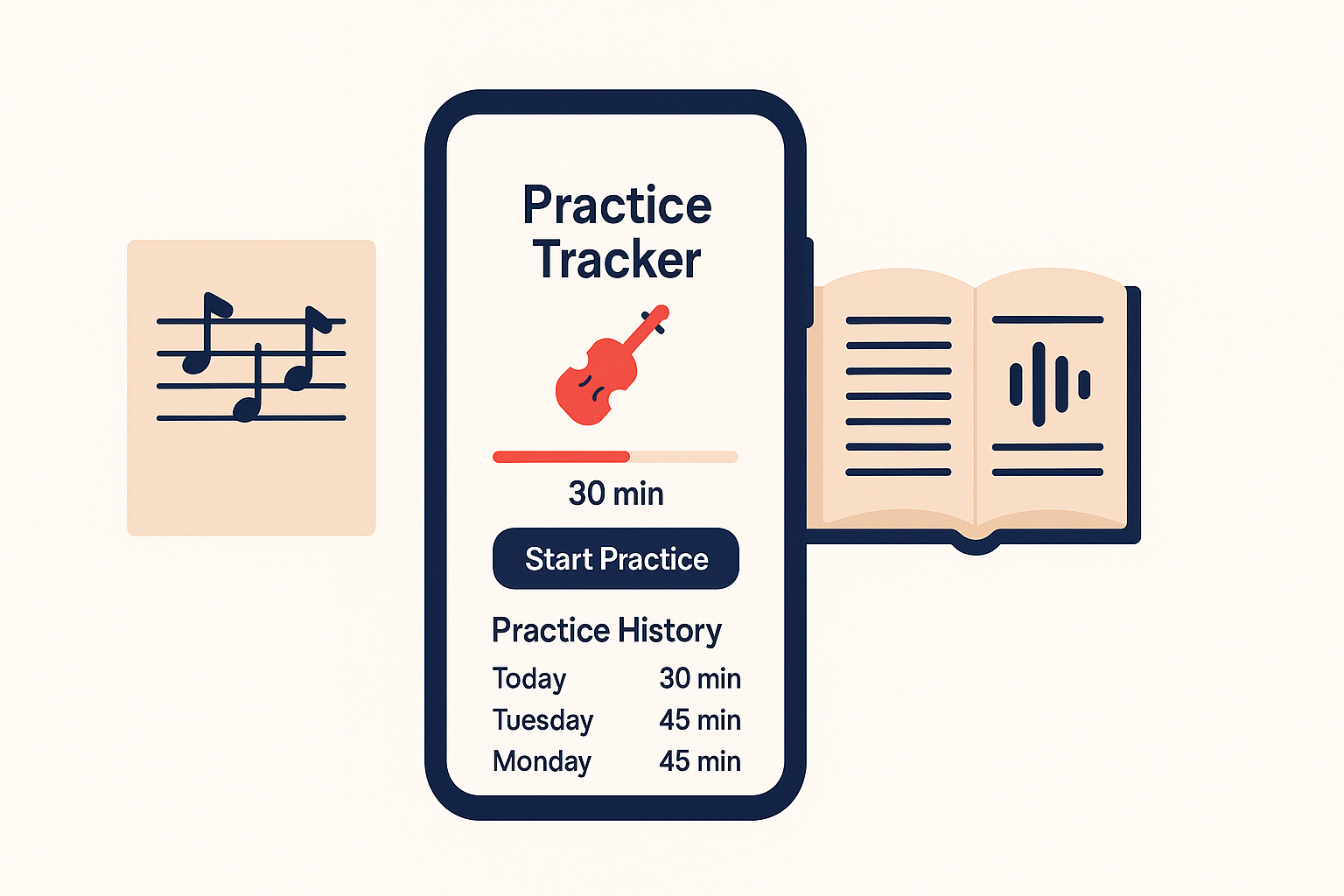Best Music Practice Tracker App for Musicians & Teachers

For many musicians, staying consistent with practice routines is harder than it should be. Even the most disciplined students and professionals often struggle to measure real progress when relying on scattered notes, paper journals, or memory alone. Without structured logging, it’s difficult to identify improvements, detect patterns, or remain accountable over time.
That’s where a dedicated music practice app comes in. A centralized instrument practice tracking app removes the friction of manual journaling and creates a transparent view of practice sessions. Musicians, students, and teachers can easily monitor progress, set goals, and record practice details in one place.
Audiorista goes beyond what a simple journal provides. Instead of just writing down notes, teachers and students can bring together written feedback, audio examples, video demonstrations, and practice schedules inside one branded, no-code app. This integration creates a more complete and interactive experience that supports effective, consistent learning. Audiorista’s platform is designed to be accessible to users of all technical backgrounds, making it easy to launch and manage a fully customized app without any coding required.
This article explains why musicians, teachers, and schools benefit from using practice tracking apps and why Audiorista makes building a custom solution simple, effective, and scalable.
Why dedicated practice tracking matters
Traditional note-taking or reliance on paper-based practice journals creates several challenges. Pages can be lost, progress isn’t easy to quantify, and both students and teachers struggle to compare past routines with current performance. For busy learners or professionals, these inefficiencies make sustained, structured practice more difficult than it needs to be.
A digital music practice tracker solves these issues by centralizing routines, setting measurable goals, and ensuring accountability. Consistency becomes easier when every session is logged, and data-driven insights replace scattered details. Students can visually track growth, professionals can maintain precision in their development, and teachers gain more efficient ways of reviewing progress over time.
Dedicated practice apps provide value across all levels. Beginners develop strong habits earlier, advancing musicians gain deeper insights into refinement, and educators benefit from organized student data in one place.
How practice apps improve learning experiences
- Practice logging: Musicians can record practice time, repetitions, and goals in a consistent and structured way, removing ambiguity from progress tracking. Audiorista enables easy practice session logging and documentation.
- Multi-format content: Integration of video, audio, and text instructions creates a richer learning environment and allows teachers to deliver material in multiple formats. Audiorista supports uploading and embedding audio, video, and written content for a comprehensive learning experience.
- Personal progress metrics: Clear insights into performance over time help students and teachers review achievements and identify areas that still need focus. Audiorista provides analytics and reporting features to support ongoing assessment.
- Teacher dashboard: Educators can manage and monitor multiple students from a single interface, centralizing communication and ongoing assessment. Audiorista’s dashboard allows teachers to oversee student engagement and progress across the platform.
Choosing between existing apps and custom solutions
Generic practice routine apps exist, but many come with limitations. These apps often lack flexibility and don’t always align directly with a school’s curriculum or a teacher’s specific approach. They may also limit control over customization, branding, and student communication. For educators or institutions, this creates gaps between teaching goals and the functionality of the available tool.
By contrast, building a fully customized and branded solution with Audiorista ensures full alignment with the needs of musicians and teachers. With Audiorista, you can create a branded no-code practice app that meets learners where they are, supports your existing methods, and carries your unique identity. Audiorista’s platform makes it easy to preview your app instantly and refine it without technical complexity, offering a seamless experience from setup to launch.
Designing custom digital tools for schools
Using Audiorista, teachers and schools can design a custom practice tracking app tailored to their programs. Whether it’s centered on specific instruments, genres, or structured lesson sequences, the platform provides all the tools needed to deliver learning content in modern, adaptable formats.
A custom app also supports monetization through subscription-based lesson models. Teachers can package lessons, practice logs, and instructional material as part of a recurring service, creating sustainable revenue while improving student engagement. Schools benefit by standardizing their digital practice framework for multiple teachers and students under one branded system.
For step-by-step guidance, you can review the steps to building your own customizable music practice app using Audiorista. This resource walks educators through the exact process of setting up and launching their tool without coding expertise, ensuring accessibility for users of any technical background.
Enhancing teaching with digital practice logs
Adopting digital practice tracking creates immediate benefits for both schools and independent teachers. Communication between students and educators improves when instructions, logs, and updates are delivered in a single, consistent app environment. Notes no longer get lost, and feedback is more structured and actionable.
Digital practice logs also enable asynchronous lessons. Teachers can prepare scales, warm-up routines, and sheet music ahead of time, making them permanently accessible. Students can practice at their own pace while still benefiting from teacher guidance, and teachers can review submitted logs and recordings without needing to be present for every session.
Another advantage lies in accountability. Structured tracking systems help reinforce student discipline and show tangible results to parents, administrators, or exam boards. Different instruments and performance levels can all be managed within the same branded digital hub.
Finally, schools and teachers gain a wider reach through subscription-based models and branded distribution. Rather than relying on external platforms, educators can share their resources in a way that reinforces their own brand identity, turning valuable teaching content into digital products that extend beyond the classroom.
Start building your own branded music practice tracker app with Audiorista today—combine lesson notes, audio demonstrations, and progress tracking in one tool made for teachers and musicians.


